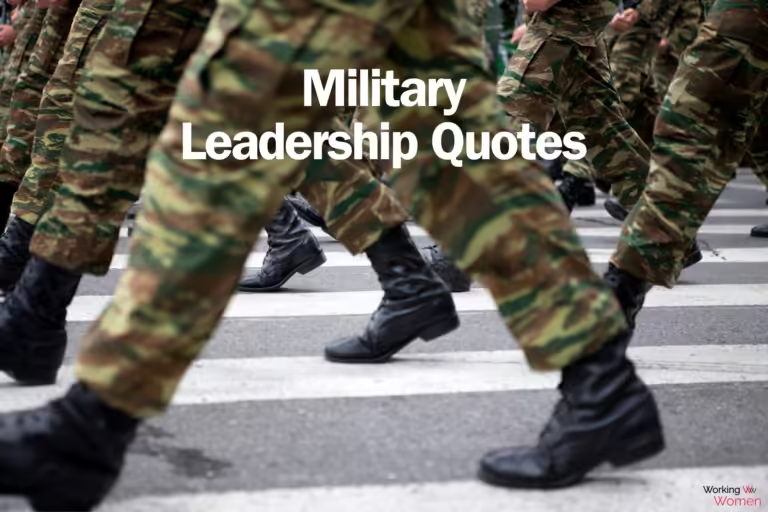Transform Your Leadership: Communication Lessons from Icons
Do you know the importance of Communication in a Leadership role? Many Leaders consider “communication” a core aspect of Leadership. This article is packed with insightful “Leadership Quotes about Communication” from history’s most impactful figures.
We’ll explore the wisdom of iconic leaders, gleaning practical strategies and inspiration from their words. Whether you struggle to articulate your vision, navigate conflict with diplomacy, or motivate your team, these quotes will equip you with the tools to bridge the communication gap and become a leader who truly connects and inspires.
Leadership Quotes about Communication
"The art of communication is the language of leadership."
James Humes
“The art of communication is the language of leadership,” a profound statement often found within collections of “Leadership Quotes about Communication,” eloquently highlights the fundamental nature of communication for effective leaders. It underscores that leadership involves more than just giving instructions.
It requires a mastery of communication, a strategic understanding of how to convey ideas, inspire teams, persuade stakeholders, and build connections. In essence, the ability to communicate skillfully becomes the very vocabulary of a successful leader.
"When the trust account is high, communication is easy, instant, and effective."
Stephen R. Covey
This insightful quote, often found among collections of “Leadership Quotes about Communication,” comes from Stephen R. Covey and emphasizes the link between trust and effective communication. Covey suggests that a strong “trust account” a metaphorical reservoir of goodwill and positive experiences built between leader and team, fosters a communication environment that is effortless, immediate, and impactful.
When trust is high, team members feel comfortable expressing themselves openly, leaders can provide constructive feedback without defensiveness, and communication becomes a natural and productive tool for collaboration and achieving goals.
"Take advantage of every opportunity to practice your communication skills so that when important occasions arise, you will have the gift, the style, the sharpness, the clarity, and the emotions to affect other people."
Jim Rohn
This quote by Jim Rohn, frequently included in collections of “Leadership Quotes about Communication,” emphasizes the importance of continual practice in honing your communication skills. Rohn isn’t advocating for robotic delivery; he highlights the need to develop the “gift”, the natural ability to connect with others, and the “style” which is your unique way of presenting ideas.
Effective communication also requires “sharpness”, the ability to think on your feet and tailor your message, and “clarity”, ensuring your message is easily understood. Finally, communication should evoke emotions, inspiring or motivating your audience. By consistently practicing these elements, you’ll be well-equipped to handle any leadership situation, allowing you to truly “affect other people” in a positive and impactful way.
"Of all the skills of leadership, listening is the most valuable – and one of the least understood."
Michael Korda
This thought-provoking quote by Michael Korda, often included in discussions on “Leadership Quotes about Communication,” challenges the traditional view of leadership skills. Korda argues that listening, often seen as passive, is actually the most valuable yet underappreciated skill a leader can possess.
Effective leaders don’t just give orders; they actively listen to understand their team’s concerns, ideas, and perspectives. This fosters trust, creates a space for open communication, and allows the leader to make well-informed decisions that resonate with the team. By prioritizing listening, leaders unlock the collective potential of their team and create a more collaborative and successful environment.
"Speak with passion... If you're going to lead, be an inspiration." –
Richelle E. Goodrich
This quote emphasizes the importance of passionate and inspiring communication for successful leaders. It suggests that merely conveying information is not enough; leaders must infuse their words with genuine enthusiasm and belief in their message to truly inspire others.
Passion is contagious, motivating teams to achieve their best. By speaking with conviction, leaders embody their vision, demonstrating their own commitment and sparking excitement in those they lead. This quote by Richelle E. Goodrich, often found in “Leadership Quotes about Communication,”
"People will forget what you said, people will forget what you did, but people will never forget how you made them feel."
Maya Angelou
This powerful quote by the renowned poet Maya Angelou, often highlighted within “Leadership Quotes about Communication,” speaks to the lasting impact of emotional connection in leadership. It reminds us that while specific words or actions might fade from memory, the emotions a leader evokes stay with their team.
A leader who instills confidence fosters a sense of belonging, or offers genuine encouragement creates a positive emotional experience that motivates and builds loyalty. This quote highlights why emotional intelligence and empathy are essential aspects of impactful leadership and lasting influence.
"One of the most important keys to successful leadership is the ability to communicate effectively... When you say one thing, but your body language says something else, your listener usually believes the nonverbal message."
Mary Ellen Slayter
This insightful quote by Mary Ellen Slayter, often found in “Leadership Quotes about Communication,” emphasizes two crucial points. First, it highlights the absolute necessity of effective communication for successful leadership. Secondly, it underscores that communication extends far beyond words. Nonverbal cues like facial expressions, posture, and tone of voice, have enormous power.
Leaders must ensure alignment between their words and their body language. If there’s a mismatch, people will instinctively trust the nonverbal signals, potentially leading to mistrust and misinterpretation. Leaders who are aware of the impact of both their words and nonverbal presence gain credibility and build strong, authentic connections with their teams.
"The quality of your leadership is determined by how well you communicate your vision. Leaders cannot be afraid to take a stand, but they must explain why."
Warren Bennis
This quote by Warren Bennis, a prominent leadership scholar, highlights the vital role of communication in defining a leader’s effectiveness, often found in collections of “Leadership Quotes about Communication.” It suggests that strong leaders not only possess a clear vision but can eloquently and persuasively communicate that vision to their team.
Additionally, Bennis emphasizes that leaders can’t shy away from taking decisive stances; however, they must also be able to justify their decisions through clear, transparent communication. Ultimately, this quote underscores that leadership is not just about having great ideas but also about inspiring and aligning others to work towards a shared goal.
"To listen well is as powerful a means of communication and influence as to talk well."
John Marshall
This quote by John Marshall, a former Chief Justice of the United States, often featured in collections of “Leadership Quotes about Communication,” challenges the common misconception that equates communication solely with speaking.
It highlights that active listening is equally potent. True leaders understand that listening attentively to their team allows them to gain valuable insights, build trust, and foster a sense of value within their team members. Moreover, effective listening allows leaders to identify potential issues, resolve misunderstandings, and make informed decisions that resonate with their team.
"We all need people who will give us feedback. That's how we improve."
Bill Gates
This quote by Bill Gates, a renowned business leader and philanthropist, emphasizes the importance of feedback within discussions on “Leadership Quotes about Communication.” It recognizes that even the most successful leaders aren’t perfect and that continuous growth requires open communication and the willingness to receive feedback.
Constructive feedback, delivered respectfully and with a focus on improvement, highlights areas where a leader can develop, refine their strategies, and ultimately become more effective. Leaders who actively seek and embrace feedback demonstrate humility, a growth mindset, and foster a culture where honest communication is valued.






